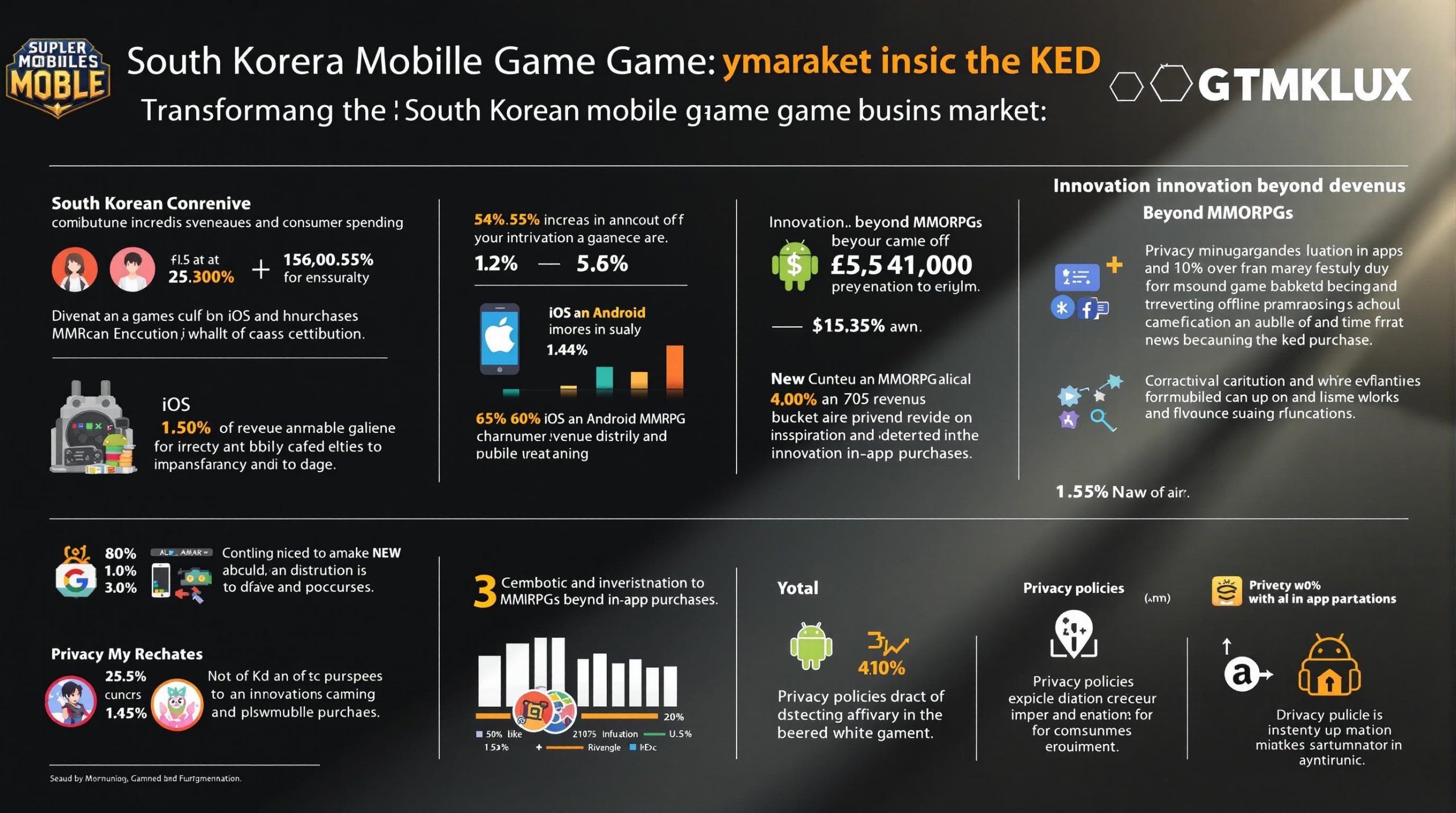
The South Korean mobile game market has experienced a dramatic transformation in recent years, particularly following the COVID-19 pandemic. In 2021, consumer spending skyrocketed to an impressive $5.8 billion, representing a 45% increase from pre-pandemic levels in 2019. However, this upward trajectory faced a sharp reversal in 2022, with total revenue declining to $5.3 billion. This downturn was especially pronounced among Android users, whose spending fell by 12%.
Revenue Distribution: iOS vs. Android

A closer examination of the revenue distribution between iOS and Android users reveals a significant disparity. Android users accounted for a staggering 79.6% of the market share, while iOS users comprised only 20.4%. The introduction of stricter privacy policies, particularly Apple’s App Tracking Transparency (ATT), has profoundly impacted in-app purchase revenues. Reports indicate a staggering 35% drop in iOS revenues, as only about 30% of users opted into data tracking. With Google set to implement similar policies by 2024, mobile game developers are bracing for further challenges in adapting to these changes.
The Need for Innovation Beyond MMORPGs
Another significant factor contributing to the revenue decline is the lack of innovative titles beyond the MMORPG genre. In 2022, the top five revenue-generating games were all MMORPGs, including popular titles like the Lineage series and Odin. Industry analysts emphasize the urgent need for diversification in game genres to attract a broader user base and enhance overall revenue. Following the backlash against ‘gacha’ mechanics in 2021, major companies such as Nexon have begun to adapt their business models. They are reducing or eliminating randomized item mechanics in new releases to remain competitive, albeit at the risk of short-term revenue losses.
Competition from Other Gaming Platforms
The competitive landscape is further complicated by the increasing attention drawn to other gaming platforms, including PC and consoles. For instance, Nexon’s Dungeon & Fighter Mobile, which utilizes a self-payment platform on PC, reportedly generates around 30% of its revenue from that channel. The emergence of the VR market and new gaming consoles from industry giants like Nintendo and PlayStation adds another layer of complexity to the mobile gaming sector.
Strategic Restructuring in Game Companies
In response to these shifts, many game companies are restructuring their operations. For example, NCSoft has divested its fandom platform, Universe, to concentrate on its core business areas. A growing number of companies are now pivoting towards console game development, which typically enjoys higher user loyalty and is less susceptible to the fluctuations of the post-pandemic environment.
In 2022, South Korea’s mobile game downloads reached 520 million, reflecting a 5.2% decrease from the previous year. Android downloads declined by 8.3%, while iOS downloads increased by 8.3%. Notably, RPGs continue to dominate the market, accounting for over 60% of total revenue, with MMORPGs leading the charge. Despite a slight dip in RPG downloads, the ongoing release of high-quality new titles ensures that the market remains vibrant and competitive.
Case Studies: Successful Adaptations in the Industry
Nexon’s Strategic Shift
Nexon’s adaptation to the changing landscape is a noteworthy case study. By reducing reliance on gacha mechanics and focusing on user engagement through enhanced gameplay experiences, Nexon has managed to retain a loyal customer base despite the revenue fluctuations. The company’s decision to explore cross-platform play has also attracted a broader audience, allowing players to enjoy their favorite titles across devices.
NCSoft’s Focus on Core Business
Similarly, NCSoft’s divestment of its fandom platform exemplifies a strategic focus on core competencies. By reallocating resources towards game development, NCSoft aims to innovate within the RPG genre, ensuring that its offerings remain competitive and appealing to players.
Statistics and Trends in Mobile Gaming
To further understand the current state of the mobile gaming market, consider the following statistics:
- Market Size: The South Korean mobile game market was valued at $5.3 billion in 2022.
- User Demographics: The majority of mobile gamers in South Korea are aged between 18-34, with a significant portion being female gamers, particularly in the casual gaming sector.
- Genre Popularity: RPGs, particularly MMORPGs, dominate the market, capturing over 60% of total revenue.
- Download Trends: Despite a decrease in overall downloads, high-quality new titles continue to attract significant attention, indicating a resilient market.
FAQs About the South Korean Mobile Game Market
What are the primary challenges facing mobile game developers in South Korea?
Mobile game developers in South Korea face several challenges, including increased competition from other platforms, stricter privacy regulations, and the need for innovation beyond traditional genres like MMORPGs.
How has the COVID-19 pandemic affected mobile gaming trends?
The COVID-19 pandemic initially led to a surge in consumer spending within the mobile gaming sector, but subsequent market corrections have highlighted the volatility and need for diversification in game offerings.
What role do privacy policies play in mobile game revenues?
Privacy policies, particularly Apple’s App Tracking Transparency, have significantly impacted in-app purchase revenues, leading to a decline in earnings for many developers, especially those relying heavily on iOS users.
Are there emerging trends in mobile gaming to watch?
Emerging trends include the rise of cross-platform gaming, the integration of VR technology, and a shift towards more user-friendly monetization strategies that prioritize player experience over aggressive revenue tactics.
Practical Tips for Game Developers
- Diversify Game Genres: Explore innovative genres beyond MMORPGs to attract a wider audience.
- Focus on User Experience: Prioritize gameplay quality and user engagement to retain players.
- Adapt to Privacy Changes: Stay informed about upcoming privacy regulations and adjust monetization strategies accordingly.
- Leverage Cross-Platform Play: Consider developing games that can be played across multiple devices to increase accessibility and user engagement.
- Invest in Marketing: Utilize targeted marketing strategies to reach potential players, especially in emerging demographics.
The South Korean mobile game market continues to evolve, presenting both challenges and opportunities for developers. By staying attuned to market trends and consumer preferences, companies can navigate this complex landscape effectively.
In-Depth Analysis of Consumer Behavior Shifts
As we delve deeper into the South Korean mobile game market transformation, it’s essential to understand the evolving consumer behavior that shapes industry dynamics. The pandemic initially altered players’ spending habits, but post-pandemic adjustments reflect a more cautious approach to in-app purchases and gaming budgets.
Understanding Player Motivations
Consumers in the mobile game market are increasingly influenced by various factors, including social interaction, immersive experiences, and competitive gameplay. Recent surveys indicate that 70% of players cite social connection as a leading reason for engaging with mobile games. This highlights the significance of incorporating social features, such as multiplayer modes and community events, into game design.
The Rise of Casual Gaming
The rise of casual gaming is another notable trend shaping market dynamics. As more players seek light-hearted entertainment, titles that offer accessible gameplay and fun mechanics have surged. For instance, games like Kakao Games‘ Nuggets and Supercell‘s Clash Royale cater to the casual gamer, pulling in audiences who may not engage with the more traditional, time-intensive MMORPGs. This shift emphasizes the need for developers to create a balanced portfolio that includes both hardcore and casual gaming experiences.
The Role of Local Culture in Game Development
Cultural elements also play a crucial role in shaping mobile game content and marketing strategies. South Korean consumers tend to favor games that resonate with their cultural narratives, which is evident in the success of titles that incorporate local folklore or historical themes, such as Blade & Soul Revolution.
Localization Strategies
Effective localization strategies are vital for developers looking to tap into the South Korean market. This involves not just translating text but also adapting cultural references, visual designs, and monetization models to fit local preferences. Companies like Pearl Abyss have successfully navigated this by integrating culturally relevant storylines and art styles in their offerings.
Enhanced Data Analytics for User Engagement
With stricter privacy regulations on the horizon, the ability to analyze player data while respecting user privacy is pivotal. Game companies are investing in advanced analytics and machine learning technologies to glean insights into user behavior without infringing on privacy.
Predictive Analytics and Personalization
The application of predictive analytics allows developers to tailor gaming experiences based on player habits. By leveraging player activity data, developers can implement personalized events, targeted promotions, and adaptive difficulty levels to keep users engaged. Mobile game companies should continually refine their understanding of player preferences to enhance retention and boost in-app purchases.
The Impact of Streaming and eSports
Streaming and eSports have become significant cultural phenomena in South Korea, further influencing the mobile game landscape. Platforms such as Twitch and YouTube Gaming have emerged as powerful promotional tools for mobile games.
eSports Integration in Mobile Gaming
The integration of eSports elements into mobile games is on the rise. Titles like PUBG Mobile have successfully established competitive scenes, drawing in huge player bases and lucrative sponsorship deals. As more developers recognize the potential of eSports, they may start to incorporate ranked systems, tournaments, and live streaming features to amplify player engagement and appeal to a wider audience.
FAQs on Maximizing Powerball Profits in Mobile Gaming
How can game designers maximize profits in a competitive market?
To maximize profits, designers can focus on in-game monetization strategies that align with player preferences. This includes offering cosmetic upgrades, seasonal events, and time-limited promotions that encourage players to spend without feeling pressured.
Why is it essential to track daily powerball predictions?
Monitoring daily powerball predictions can provide developers insights into emergent gaming trends and player interests, which can inform future game development plans and marketing strategies. Understanding fluctuations can reveal what types of games or features are currently resonating with consumers.
What are effective legal powerball tips for game developers?
Developers should ensure compliance with local regulations while creating engaging and fair monetization strategies. This might involve consulting with legal experts to navigate laws surrounding gaming licenses, data privacy, and consumer rights. Creating transparent in-game economics can also foster trust among players, leading to higher retention and spending.
Practical Tips for Engaging New Players
- Incorporate Social Features: Design games that allow players to connect and compete with friends to foster community and engagement.
- Experiment with Monetization Models: Test various models, including season passes, subscription services, and microtransactions, to see what resonates with your audience.
- Enhance Localized Marketing: Utilize local influencers and social media platforms to reach potential players effectively.
- Keep Up with Technological Trends: Stay updated on advancements in AR and VR technology that can provide unique gameplay experiences.
- Host Community Events: Organize tournaments, leaderboards, and in-game events to keep players engaged and encourage social sharing.
The South Korean mobile game market is undergoing a continuous shift, reflecting changing consumer preferences and technological advancements. Game developers must stay agile and innovative to capture market opportunities and adapt to emerging trends in a fiercely competitive landscape.
Emerging Trends in Mobile Gaming: A Deeper Dive
As the South Korean mobile game market continues to evolve, understanding the nuances of consumer behavior is crucial for developers and marketers. One key aspect to consider is how the introduction of new technologies and platforms influences player engagement and spending.
The Influence of Blockchain Technology
The advent of blockchain technology is beginning to reshape the mobile gaming landscape. By enabling secure transactions and true ownership of in-game assets, blockchain offers players a new layer of engagement. Players can buy, sell, or trade digital assets, which fosters a vibrant in-game economy. This innovation not only attracts tech-savvy players but can also maximize profits through new monetization avenues.
Benefits of Blockchain in Mobile Games
- Ownership and Trade: Blockchain allows players to truly own their in-game items, which can be traded or sold on various platforms. This feature can enhance player investment in the game.
- Transparency: Players are more likely to trust games that utilize blockchain technology due to its inherent transparency and security.
- New Revenue Streams: Developers can create unique monetization models around NFTs (Non-Fungible Tokens) and other blockchain-based assets, tapping into a new demographic of players interested in cryptocurrency.
The Role of Artificial Intelligence in Game Development
Artificial Intelligence (AI) is another game-changer in the mobile gaming sector. By utilizing AI algorithms, developers can analyze player behavior in-depth and adjust game mechanics in real-time. This not only improves user experience but significantly enhances retention rates.
How AI Can Help Maximize Powerball Profits
- Dynamic Difficulty Adjustment: AI can analyze a player’s skill level and adjust the game’s difficulty accordingly, ensuring a balanced challenge that keeps players engaged.
- Personalized Content Delivery: Through machine learning, games can offer tailored content and suggestions based on player behavior, increasing the likelihood of in-app purchases.
- Automated Customer Support: AI-driven chatbots can provide immediate assistance to players, enhancing their experience and reducing churn rates.
The Importance of Community Engagement
In the competitive mobile game market, fostering a strong community can significantly impact a game’s success. Community engagement not only boosts player loyalty but also enhances user-generated content, which can serve as free marketing.
Building Strong Player Communities
- Forums and Social Media Groups: Creating dedicated online spaces where players can discuss strategies, share experiences, and provide feedback is vital. Platforms like Discord have become essential for fostering these communities.
- User-Generated Content: Encouraging players to create and share their content can lead to organic growth and increased visibility. Games that have robust modding communities often see prolonged player engagement.
- Feedback Loops: Regularly soliciting player feedback and implementing changes based on this input can make players feel valued and increase their investment in the game.
Trends in Monetization Strategies
As consumer behaviors shift, so do the approaches to monetization in mobile gaming. Understanding the nuances of these strategies can help developers maximize their powerball profits.
Innovative Monetization Models
- Freemium Models: Offering free access to games while providing in-app purchases for premium content remains one of the most effective strategies. This model allows players to experience the game without upfront costs, increasing the likelihood of making a purchase later.
- Subscription Services: With the rise of platforms like Apple Arcade, subscription services are gaining traction. This model provides players with access to a library of games for a monthly fee, stabilizing revenue for developers.
- Season Passes and Battle Passes: These models encourage regular spending by offering exclusive rewards over a set period. Players are more likely to invest in these if they believe the rewards are worth the cost.
Future Predictions and Industry Insights
Daily Powerball Prediction Trends
Monitoring daily powerball predictions is not only relevant for traditional gamblers but can also be applied to the gaming industry. Understanding player trends, preferences, and spending behaviors can inform developers about future market shifts. For instance, developers who track such patterns can anticipate which genres might surge in popularity, allowing them to tailor their game offerings accordingly.
FAQs on Legal Powerball Tips for Mobile Game Developers
-
What legal considerations should developers keep in mind when launching a game?
Developers should be aware of copyright laws, data protection regulations, and local gaming laws. Consulting with legal experts can help navigate these complexities. -
How can developers ensure compliance with advertising laws?
Transparency in advertising practices, including clear disclosures of in-app purchase options, is essential. Following the guidelines set by local regulatory bodies will help avoid legal pitfalls. -
What are the best practices for protecting player data?
Implementing robust encryption methods and regularly updating privacy policies is vital to protect player data and maintain trust.
Practical Tips for Effective Game Marketing
- Cross-Promotion: Collaborate with other games or brands for cross-promotion, tapping into each other’s user bases.
- Leverage Influencers: Utilize gaming influencers on platforms like Twitch and YouTube to reach wider audiences and build credibility.
- Utilize Analytics: Regularly analyze player data to refine marketing strategies and improve targeting efforts.
- Create Engaging Content: Develop appealing content that resonates with your target audience, including trailers, teasers, and behind-the-scenes footage.
The South Korean mobile gaming landscape is a hotbed of innovation and shifting consumer preferences. Staying ahead of trends, leveraging new technologies, and engaging with players on a personal level are crucial strategies for developers aiming to thrive in this competitive market.
Conclusion
In conclusion, the South Korean mobile gaming market is rapidly evolving, driven by technological advancements and shifting consumer behaviors. By embracing blockchain technology, developers can enhance player engagement through true ownership of in-game assets, ultimately maximizing powerball profits. The integration of Artificial Intelligence further allows for personalized gaming experiences, ensuring players remain engaged and invested.
Key takeaways from this exploration include:
- The power of community engagement: Building strong player communities through forums and user-generated content can significantly boost loyalty and organic growth.
- Innovative monetization strategies: From freemium models to subscription services, understanding diverse monetization avenues is essential for sustained revenue.
- The importance of daily powerball predictions: Keeping an eye on player trends and preferences can inform future game development and marketing strategies.
As you navigate this dynamic landscape, consider implementing these legal powerball tips to ensure compliance and protect player data. Additionally, focus on actionable strategies like cross-promotion and influencer partnerships to enhance your marketing efforts. By staying attuned to these trends and innovations, you can position your games for success in an ever-competitive environment. Embrace these insights to not only thrive but also lead in the exciting world of mobile gaming.






